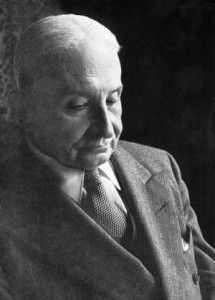Wednesday

Von Mises
I'm fifty pages into Human Action. Only 850 pages to go.
I'm impressed, to put it mildly. Of course, I went in expecting to be blown away, so the book had a receptive audience, but still: it's awfully impressive so far. His insight into human nature, his grasp of the limits of historical knowledge, his intelligent skepticism. Those are just a few things he has touched upon so far.
I'm also struck by his agnostic religious stance. Here was a man who held the ultimate to be unknowable, yet strained to know everything else. Too often, Ultimate Skepticism leads to flippant skepticism about everything else, but not with von Mises. He embraced a profound skepticism that he turns on everyone, including The Voltarbacons (my term, meaning "the smug intellectual descendants of Voltaire and Bacon"). Especially on the Voltarbacons, actually.
Although he has little use for scientific/historical empiricism, he seems to have no animus toward religion whatsoever. He doesn't agree with its dogmas, but that disagreement doesn't invalidate religion for him as a genuine and legitimate motivator for others. Religious belief is a phenomenon that must be acknowledged, respected, and accounted for. Von Mises would never join the Voltarbacon humanist descendants, who sought to ditch God and replace Him with one or more pseudo-gods (most of which can be lumped under the sin of "Immanentizing the Eschaton").
Von Mises' skepticism insists we know only a handful of things. Not even a handful. Based on my reading so far, he starts with a mere two truths: (1) Man desires to live; (2) Man desires happiness. (Note) From those truths, he builds a framework for understanding why people (and markets) behave the way they do.
In this, he's also friendly to religion because he seems to embrace the natural law. He accepts the fact that we can argue a priori: starting with natural law precepts and reaching conclusions, whereas the Voltarbacons started with the assumption that we know nothing and must accumulate knowledge.
